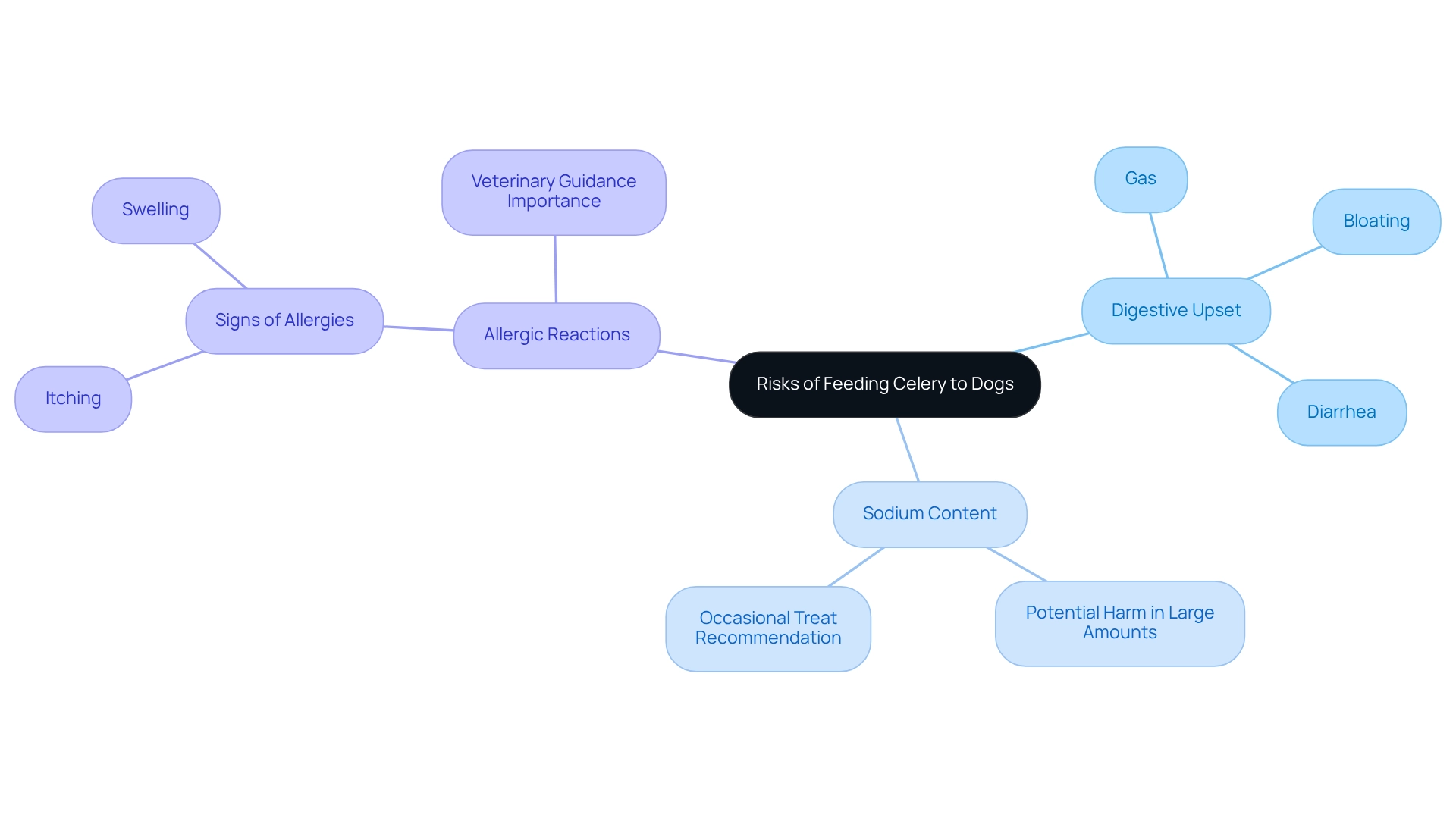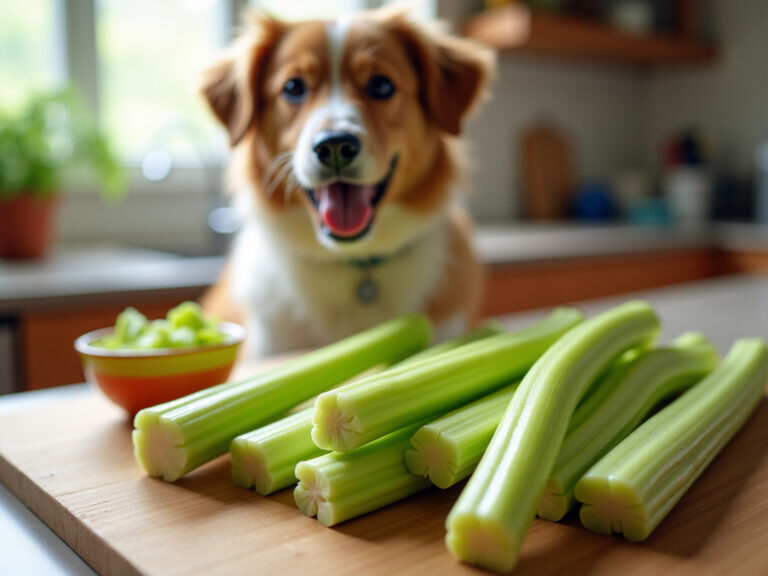Can Dogs Have Celery? Safe Introduction and Benefits Explained
Overview
As a loving pet owner, you may wonder about safe and nutritious snacks for your furry family members. Did you know that celery can be a delightful treat when introduced in moderation? This crunchy vegetable not only provides hydration but also offers essential vitamins that can benefit your dog’s health.
Celery is low in calories and fat, making it a guilt-free snack option. However, it’s important to serve it fresh and cut into small pieces to ensure your pet can enjoy it safely. Remember, while celery can be a fun addition to your dog’s diet, it should never replace a balanced meal.
Before introducing any new food, including celery, it’s always wise to consult with your veterinarian. They can help ensure that this tasty treat aligns with your dog’s specific health needs, giving you peace of mind as you nurture your beloved companion. By making informed choices, you’re creating a nurturing environment that supports your pet’s well-being.
Introduction
In the pursuit of healthier snacks for your furry family members, celery stands out as a surprisingly beneficial option for dogs. This crunchy vegetable not only provides a low-calorie treat but also boasts essential vitamins and minerals that can enhance your dog’s health. However, while celery can be a nutritious addition, it’s crucial for pet parents to understand how to safely introduce it into their beloved companions’ diets.
From the many benefits it offers to potential risks, this guide will explore everything you need to know about feeding celery to your dogs, ensuring a safe and enjoyable snacking experience for all.
Determine Celery’s Safety for Dogs
When offered in moderation, celery can be a delightful and nutritious snack for your furry family members, leading to the question of can dogs have celery? This crunchy vegetable is low in calories and fat, making it a wonderful choice for maintaining a healthy weight. To ensure your dog enjoys this treat safely, it’s crucial to provide fresh celery that is free from pesticides. A thorough wash before serving is essential. For dogs weighing between 2 to 20 pounds, one to two pieces of celery can be an appropriate serving size.
In addition to being a low-calorie option, celery is composed mostly of water, which can help keep your dog hydrated. It also contains important vitamins K, A, and C, along with vital minerals like iron, potassium, and calcium, all contributing to your dog’s overall well-being. However, while considering if can dogs have celery as a healthy addition to your dog’s diet, it should not replace a balanced meal plan, ensuring they receive all necessary nutrients. Before introducing celery or any new food into your dog’s diet, it’s always a good idea to consult with your veterinarian, especially if your dog has pre-existing health conditions or dietary restrictions. Additionally, be mindful of dishes that may contain toxic ingredients, such as onions, which can be harmful to dogs. By taking these precautions and ensuring moderation, you can safely share the benefits of this crunchy snack with your beloved pet.
Introduce Celery to Your Dog Gradually
Sentence: “Start by offering your furry family member a small piece of vegetable, about one inch in length.”
- It’s important to monitor your dog closely for any signs of digestive upset, such as vomiting or diarrhea, over the next 24 hours.
- If your dog handles the vegetable well, you can gradually increase the serving size, especially if you are wondering, can dogs have celery?
- Always slice the vegetable into bite-sized pieces to minimize choking hazards, especially for smaller breeds, while considering if can dogs have celery.
- This gradual introduction allows your dog to adapt to the new food without overwhelming their delicate digestive system, prompting the question: can dogs have celery?
- Veterinary recommendations suggest that this crunchy treat, as part of the discussion on can dogs have celery, should not make up more than 10% of your dog’s daily caloric intake, ensuring a balanced diet while introducing this new option.
- Always double-check that the vegetable is free from harmful additives before serving it to your beloved pet, especially when you are wondering, can dogs have celery?
- Additionally, consider creating frozen vegetable treats by dipping vegetable pieces in dog-friendly broth or yogurt and freezing them. This not only provides hydration but also offers a refreshing snack during the warmer months.
As Stevie McCulloch wisely advises, “Always consult with your veterinarian before introducing new treats, and ensure that your pet’s overall diet is appropriate for their specific needs and health status.” This consultation is essential to ensure that the introduction of this vegetable aligns with your pet’s dietary needs. Remember, your pet’s health and happiness are what truly matter.
Explore the Benefits of Celery for Dogs
It is essential to consider can dogs have celery, as this vegetable is a powerhouse of nutrition for your furry family members, packed with essential vitamins A, C, and K, alongside potassium and folate. These nutrients offer a range of health benefits that can truly enhance your pet’s well-being:
- Digestive Health: The high fiber content in celery promotes healthy digestion and supports regular bowel movements, which is crucial for overall well-being.
When considering weight management, many pet owners wonder, can dogs have celery as a low-calorie snack for those needing to shed a few pounds? As Ernie Ward, DVM, founder and president of the Association for Pet Obesity Prevention, notes, “This reveals an opportunity for better communication training, patient support tools, and treatments,” emphasizing the importance of addressing pet obesity. This aligns with the fact that 76% of pet owners acknowledge their veterinarians’ recommendations for weight loss.
This vegetable, which is about 95% water, is an effective way to keep your dog hydrated, leading to the question: can dogs have celery, especially during warmer months when hydration is vital? - Dental Well-being: The crunchy nature of this vegetable can assist in minimizing plaque accumulation on your dog’s teeth, promoting improved oral hygiene and overall dental well-being.
By adding this nutritious vegetable to your dog’s diet, you not only improve their nutritional intake and support their health in various ways, but you also might wonder, can dogs have celery? It’s a valuable enhancement to their meals, ensuring they thrive in a nurturing environment.
Understand the Risks of Feeding Celery to Dogs
While this vegetable can be a safe snack for many dogs, it’s important to consider some potential risks that could affect your furry family members when you ask, can dogs have celery? To keep your pet safe, always cut the vegetable into small, manageable pieces before offering it. Remember, veterinary insights suggest that being careful with portion sizes is essential to avoid choking incidents.
- Digestive Upset: Introducing stalks too quickly or in large quantities can lead to gastrointestinal issues, such as gas, bloating, or diarrhea. Moderation is key to preventing these discomforts.
- Sodium Content: Celery naturally contains sodium, which can be harmful in large amounts. It’s best to consider celery as an occasional treat rather than a regular part of your pet’s diet.
- Allergic Reactions: Some animals may develop allergies to celery. Keep an eye out for signs of an allergic reaction, such as itching or swelling, and consult your veterinarian if you notice any unusual symptoms. Given that food allergies account for approximately 5% of all skin-related issues in dogs, seeking veterinary guidance is vital for diagnosing and managing potential food allergies when introducing new foods like celery.
Understanding these risks is crucial for ensuring your dog’s health and safety when introducing new foods into their diet. Always prioritize your pet’s well-being by being cautious with new treats and seeking veterinary advice when necessary. Your commitment to their health creates a nurturing environment where they can thrive.

Conclusion
Incorporating celery into your furry family member’s diet can offer a variety of health benefits, making it a nutritious snack option for pet owners eager to promote their companions’ well-being. This crunchy vegetable is low in calories and fat, rich in essential vitamins and minerals, and can help with hydration and digestion. However, it’s vital to introduce celery gradually, ensuring it’s prepared in small, manageable pieces to prevent choking hazards, especially for smaller breeds.
Despite its many advantages, celery does come with certain risks that deserve careful consideration. Potential choking hazards, digestive upset from overconsumption, and the possibility of allergic reactions highlight the importance of moderation and vigilance when introducing any new food into your dog’s diet. Consulting with a veterinarian is always recommended to tailor dietary changes to your pet’s individual health needs and conditions.
Ultimately, with proper precautions and a thoughtful approach, celery can serve as a delightful and healthy treat that enriches your dog’s diet. By understanding both the benefits and risks, you can confidently provide your beloved companion with this crunchy, hydrating snack, contributing to their overall health and happiness.
Frequently Asked Questions
Can dogs eat celery?
Yes, dogs can eat celery in moderation. It can be a delightful and nutritious snack for them.
What are the nutritional benefits of celery for dogs?
Celery is low in calories and fat, making it a good choice for maintaining a healthy weight. It is mostly water, which helps keep dogs hydrated, and it contains important vitamins K, A, and C, as well as minerals like iron, potassium, and calcium.
How should celery be prepared for dogs?
Always provide fresh celery that is free from pesticides. A thorough wash before serving is essential to ensure safety.
What is the appropriate serving size of celery for dogs?
For dogs weighing between 2 to 20 pounds, one to two pieces of celery can be an appropriate serving size.
Can celery replace my dog’s regular meals?
No, celery should not replace a balanced meal plan. It is important to ensure that dogs receive all necessary nutrients from their main diet.
Should I consult with a veterinarian before giving my dog celery?
Yes, it’s a good idea to consult with your veterinarian before introducing celery or any new food into your dog’s diet, especially if your dog has pre-existing health conditions or dietary restrictions.
Are there any precautions to consider when feeding dogs celery?
Be mindful of dishes that may contain toxic ingredients, such as onions, which can be harmful to dogs. Always ensure that treats, including celery, are given in moderation.







